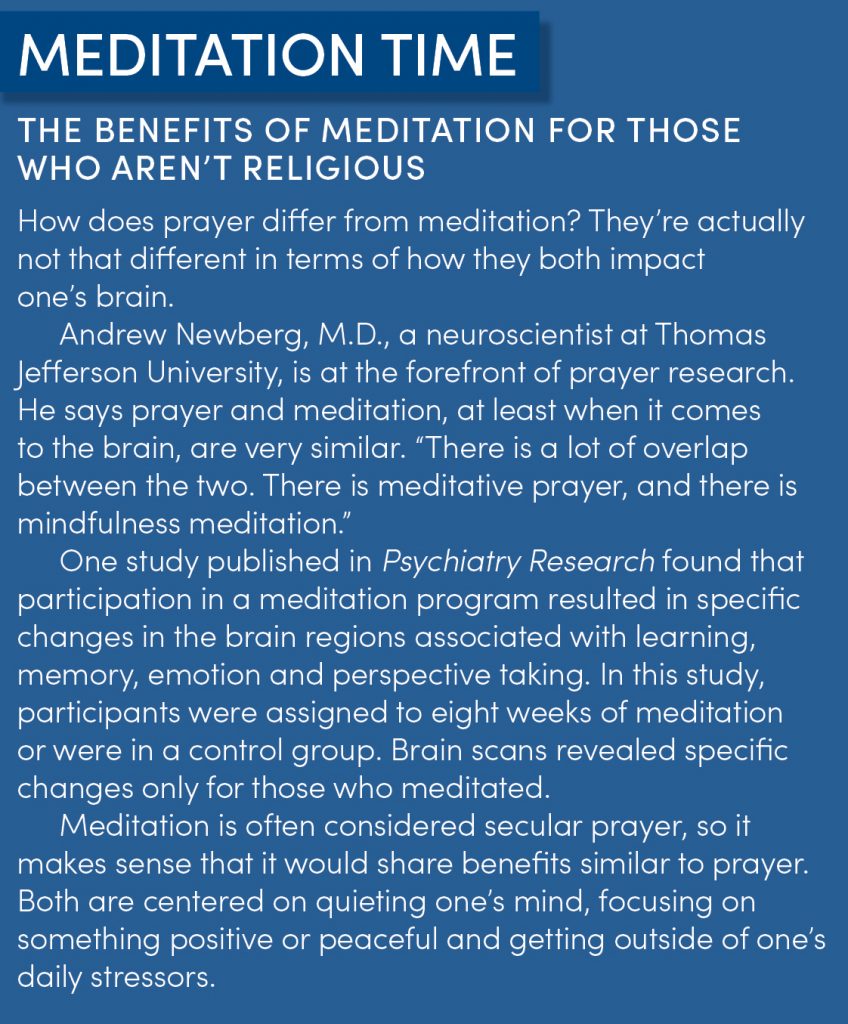Carly was feeling overwhelmed with life. A budding entrepreneur, she was passionate about her business and truly believed in what she was doing. But fear often got the best of her. What if the business fails? she thought. What if no one wants to buy from me? What if I don’t make enough money this month to pay the bills?
Although she knew worrying wasn’t helpful, she couldn’t control it. And then she started praying. “One day I was feeling so stressed out, and I didn’t know what to do,” she says. “I knew I should be grateful for what I had, but I just couldn’t feel that way. So I decided to pray. And after, I remember feeling much calmer. I was able to remind myself why I was doing this, and how I had been successful in the past. It was like I received a pep talk from someone I actually believed. Now I start my day off each morning with a prayer.”
For Carly and countless others, prayer plays an important role in overall well-being. It can influence everything from how stressed we are to how well we bond with other people. It can increase our positive brain chemicals—like dopamine and serotonin—while also leading to improved self-control. It can even help us live longer, according to demographer Dan Buettner, who found that belonging to a faith-based community is common among the centenarians in “Blue Zones,” the areas of the world with the highest concentration of people who reach age 100.
But the type of prayer matters, as does the method by which we pray.
With more than 75 percent of Americans reporting they pray and 55 percent reporting they pray every day, according to the Pew Research Center, prayer is interwoven in many of our daily lives. And although not everyone prays, many meditate, which has a similar effect.
People pray for myriad reasons, but the overall result is the same: Prayer can make you happier, calmer and better equipped to deal with the problems life presents.
***
First, a few disclaimers. Very few people of faith—of any faith—would claim that prayer alone will solve all of your problems or that every prayer will be answered, and that is not the point here. Rather, according to the experts we spoke with, the act of praying itself can help us reap rewards for our subjective well-being—what positive psychologists call happiness. To put it simply, it doesn’t necessarily matter which faith we observe, but rather that we pray at all. And we’ll point out once again that meditation does have a similar effect.
Biological and psychological mechanisms are at work when we pray. There is an entire new field of science devoted to understanding what changes happen in our brains when we engage in religious experiences or practices, called neurotheology, or the neuroscience of religion. At the forefront of this research is Andrew Newberg, M.D., a neuroscientist at Thomas Jefferson University in Philadelphia.
“When prayer elicits feelings of love and compassion, there is a release of serotonin and dopamine,” Newberg says. Both of these neurotransmitters play a role in how you feel. Serotonin has a direct impact on your mood, and not having enough serotonin has been linked to depression. Dopamine, on the other hand, is associated with reward and motivation.
A research study conducted by Newberg and his colleagues found that following a retreat centered on prayer and meditation, people experienced beneficial changes in their dopamine and serotonin levels. And Newberg says those changes were not just temporary, but resulted in long-term improvements. He believes prayer and meditation can result in permanent changes in the brain regarding these neurochemicals.
***
Prayer can also boost overall happiness, especially when we define happiness as having meaning and connection in one’s life. Living a life of meaning and purpose contributes to overall positive feelings, and praying to a higher power is based on the belief that there is something greater than one’s everyday life and stressors. When praying, a person focuses on the bigger picture of what is important, which counters the taxing minutiae of everyday life.

“When people pray, they evoke a physiological response that’s opposite to the stress response: the relaxation response,” says Herbert Benson, M.D., the founder of the Benson-Henry Institute for Mind Body Medicine at Massachusetts General Hospital and a professor at Harvard Medical School. “Because when you pray, you break the train of everyday thought through repetition of a word, sound, prayer or phrase.”
“Both prayer and meditation can elicit the relaxation response—and thus effect positive physiological changes—but intention matters.”
Prayer can influence numerous areas of our lives, all of which contribute to our overall positive emotions. It can help someone feel connected to a source of unconditional love, reduce emotional distress, serve as a healthy coping mechanism, enhance one’s sense of self, boost one’s happiness in relationships and encourage positive behaviors. The researchers we spoke with identified six key areas where prayer gives us a boost.
1. More Connection
Connection is one of the most powerful contributors to happiness. After all, we are social beings. Prayer to a God who is viewed as caring can be seen as a conversation with an entity who possesses unconditional love for the person praying. Prayer is a nurturing interaction with someone who cherishes you for who you are, flaws and all. And even when others in your life might let you down, your higher power is always present, always loving.
Blake Victor Kent, a Ph.D. candidate in the department of sociology at Baylor University, has done extensive research on the impact of prayer on well-being. “Fundamentally, [prayer] is based on the assumption that God cares about you and is interested in you,” Kent says. “If [you believe] those two things are true, then prayer would have great mental health benefits because it means you’re not alone. Just as any close and caring relationship provides social support, so does a positive relationship with God.”
Researchers at Baylor have explored the concept of secure attachment (a bond between two entities) to God when it comes to the benefits of prayer. In psychology, the focus of attachment is often one-sided—how one person views his or her bond with another person. Attachment theory was born in the late 1950s and looked at how children interacted with a parent. In a secure attachment, the child felt protected and cared for by his or her parent. These children exhibited less overall distress.
“Our research shows that when people have a warm and secure attachment to God, prayer is associated with positive mental health outcomes,” Kent says. “But when the relationship is cold or distant, prayer is associated with negative mental health outcomes. Imagine the difference of praying to a God that loves and cares for you versus a God who is inconsistent, distant or even disappointed in or angry with you. The mental health result is not the same.”
2. Less Depression
Research shows a connection with a higher power can assist with treatment of depression. One study published in the Journal of Clinical Psychology found that those who held “a belief in a concerned God” had better results in treating their depression.
And a two-year study, “The Protective Effects of Religiosity on Depression” published in the journal Gerontologist, found that prayer might help protect against depression in addition to assisting with recovery from depression. Over a two-year period, those who prayed were less likely to develop depression if they were depression-free at the beginning of the study. And if they already had depression when the research began, they were more likely to recover if they prayed. Prayer can help reduce the sense of hopelessness often associated with depression.
Certain brain regions appear to be influenced by praying, too. People who regularly pray or meditate show a thickening of their brain cortex (those who are clinically depressed typically show a thinning in the brain cortices). This thickening could help protect against depression and other mental health disorders.
In addition, one common feeling that can contribute to depression is helplessness. We often don’t have control over our problems, and emotion-focused coping (changing your emotional reaction to the problem) can help. Using prayer as a coping mechanism can help reduce a sense of helplessness and increase one’s empowerment. That’s one reason why prayer worked for Carly.
3. Less Stress
The mere act of praying can help decrease tension and worry. Someone who is less stressed has lower levels of cortisol, the stress hormone that contributes to a fight-or-flight response. One study published in the Journal of the Medical Association of Thailand showed cortisol decreased in people during meditation, and as we know, prayer and meditation function in a similar way.
“Repetitive prayer—like the rosary—breaks the train of everyday thinking and evokes the relaxation response, which counteracts the harmful effects of stress,” Benson says.
4. Improved Forgiveness
Praying for other people increases one’s willingness to forgive them. When participants in a study published by the journal Psychological Science were asked to pray about someone they cared about (romantic partner or friend), they reported a greater ability to forgive the person. Praying had a significant impact even after controlling for gratitude, religiosity, prayer frequency and gender.
In addition to boosting one’s ability to forgive others, prayer can have a positive long-term effect on relationships. For example, when praying for a partner, participants in a study published in the Journal of Social and Personal Relationships reported greater “satisfaction with sacrifice” (feeling OK about putting their partner’s needs before their own). Not only did the people praying for their partner experience this greater satisfaction, but objective observers also noticed the positive difference.
5. Less Anger
Prayer can help someone feel less angry and react less aggressively toward others. One research study, “‘Pray for Those Who Mistreat You’: Effects of Prayer on Anger and Aggression,” showed that praying for a stranger or a friend who has angered you helps you be less aggressive than if you merely thought about the person.
This was a three-part study: The first experiment found that people who prayed for a stranger instead of just thinking about the stranger reported fewer angry feelings. In the second experiment, subjects who prayed for someone who angered them were less aggressive toward that person than those who just thought about someone who frustrated them. And in the third experiment, those in the study who prayed for a friend demonstrated less anger in how they appraised a situation.
6. Better Self-Control
Research shows prayer can also impact our behavior, especially our self-control.
In the study “Personal Prayer Buffers Self-Control Depletion” published in the Journal of Experimental Social Psychology, participants who briefly prayed before an emotion-suppression task were better able to cope with that stress, as opposed to those who did not pray beforehand. Even just priming oneself with religious words can boost self-control. The research showed that the boost in self-control was present only for participants who view prayer as an interaction with God.
In addition, one New York University study suggests prayer might impact alcohol consumption: Brain scans showed that praying could actually reduce cravings for alcohol.
***
Not all research points to the benefits of prayer. In fact, prayer has been shown to be associated with an increase in distress and even psychiatric disorders for some people.
So which is it? Is prayer helpful or hazardous? The key is looking at the intention associated with the prayer as well as the type of prayer.
“Both prayer and meditation can elicit the relaxation response—and thus effect positive physiological changes—but intention matters,” Benson says. “If you’re doing either activity mindlessly, you won’t derive any health benefits. But if you are engaging in these activities as originally intended, you can elicit the relaxation response and effect positive health outcomes.”
In analyzing types of prayer, one Eastern Illinois University study looked at the benefits of six different prayer types: adoration (love), confession (disclosing one’s sins or offenses), thanksgiving (gratitude), supplication (asking for something), reception (centered on receiving guidance) and obligatory (feeling mandatory).
“When prayer is focused on being more positive, open and loving, then you have an increase in positive benefits.”
Only adoration, thanksgiving and reception prayers were associated with greater well-being. These prayer types share a positive focus on God. In contrast, prayer that is centered on the person praying (such as confessional prayer) did not glean these positive results for subjective well-being.
“It depends how prayer is used,” Newberg says. “If it is used to foster anger, hatred or exclusivity, then the person will feel more negative, [have] greater anxiety and more stress…. But when prayer is focused on being more positive, open and loving, then you have an increase in positive benefits.”
Another study found that meditative prayer (focusing on a word or phrase) and higher frequency of prayer both had a positive impact on the measure of well-being. Pleas for help during prayer, on the other hand, resulted in poorer well-being.
If prayer or meditation is part of your common practice, keep it up. If it isn’t, consider finding an approach that works for you. Whether that’s prayer or just general meditation, connecting with your thoughts on a deeper level has countless benefits. Just make sure you choose a practice that is focused on a positive experience and one that feels right for you.
Once you choose a path, don’t fixate on receiving the positive outcome of your practice. Instead, concentrate on enjoying the process. The positive feelings will follow.




